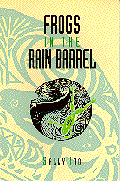

![]()

|
Frogs in the Rain Barrel.
Sally Ito. Subject Heading:
Grades 10 and up / Ages 15 and up.
***/4
|
excerpt:
RACHEL
I have not met a man
so strong as the snake
who grabbed my ankles
and wrestled me to the ground.No, not even you, Jacob.
If in that night,
I had a branch,
I would have chased it off.But the enormity of it,
the promise of its poison!At long last,
the liberating of my thighs
to the cry of birth.Forgive me, dear Jacob, forgive me
but I too have wrestled,
with this monster
called Love.
SALLY ITO'S POETRY tantalizes, transfixes, and torments the reader. Her powerful control of images is like the work of a pointillist, where very little can evoke energy, emotion, and eroticism. Ito is a mirrored mosaic, a master at reflecting so many different aspects that she initially overloads a reader -- but then draws them back again and again to look deeper and deeper in to the poetry, and into themselves.
Ito's poems reflect not only her Japanese-Canadian culture, but also her experience in the diverse locations where she has lived and worked. This is Sally Ito at her best as she uses images to bring not only a scene, but the emotions it contains, to life:
CHINESE OLDTIMERHe sat solitary
amidst a circle of boxes,
bound and rebound in twined string,
sides scribbled with faded Chinese characters
promising canned oranges, lotus root
and pickled ginger.A circle of clucking relatives
moved around him
"Time for Grandfather to move."
-- move to the next grudging
son in Calgary.The train whistled its last call.
Ito's feminism is strong throughout, as she writes of her growth from child to woman to mother; a glimpse of all three stages comes in her poem "Sonata for Three Sleeping Woman."
Her celebration of feminism is among the few ties that bind this collection together. Ito seems to be experimenting with a wide range of styles, from those that leave out vowels to those that play with the placement of words -- to some that reach levels of obscurity that leave the reader wondering and speculating. It feels like she is searching not only for her voice, but for herself; as though she were trying to tie the diverse stages and experiences of her life together. It is almost as if she has not yet accepted and melded her many aspects into one.
In Frogs in the Rain Barrel, Ito seems to share her struggles towards maturity in both her poetry and her life. In those struggles we can find elements of our own. And the very foreignness of some of her images forces us to step back and rethink how we see the world and our lives.
Recommended.
William F. Benson is a school psychologist in Nanaimo, British Columbia.
To comment on this title or this review, send mail to cmeditor@mts.net.
![]()
Copyright © 1996 the Manitoba Library Association.
Reproduction for personal use is permitted only if this copyright notice
is maintained. Any other reproduction is prohibited without permission.
Published by
The Manitoba Library Association
ISSN 1201-9364
![]()